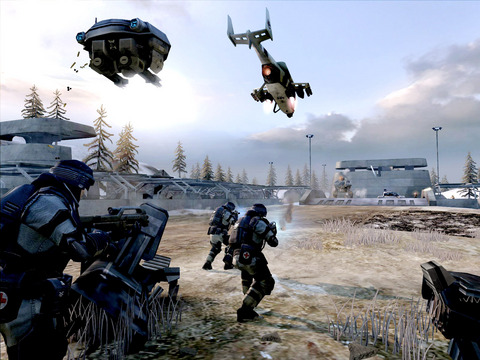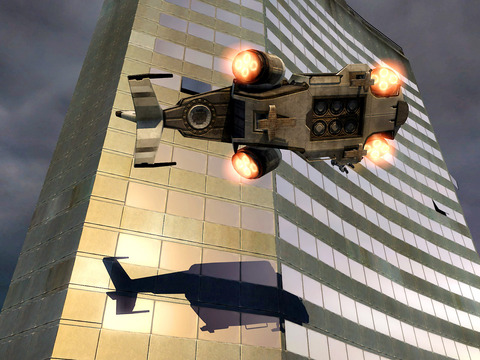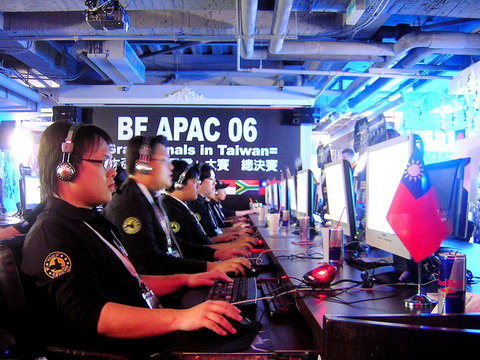They met yesterday in Taipei for the Grand Final of the first Battlefield Asia Pacific Arena Contest, a tournament held to promote Battlefield 2142, the latest installment in one of the world's most popular multi-person first-person shooter computer games. Held at the Ha2 Internet Cafe (哈哈活力站) in Taipei's Shilin district, the tournament saw teams from nine countries duke it out on a computer combat zone of futuristic fighter jets, mechanized robot walkers and 22nd-century tanks.
In Battlefield 2142, players have at their disposal an arsenal of hi-tech assault rifles, cloaking devices and sentry guns. The game puts a premium on teamwork and allows players to operate vehicles. In matches played online, teams can comprise as many as three-dozen players, who communicate with squad leaders via headsets connected to their computers.
The teams in Battlefield Asia Pacific had only eight players. The goal was to capture and hold flags scattered across the battlefield. The more flags a team controlled, the more often its players could "respawn," or come back to life after being killed.

PHOTOS COURTESY OF ELECTRONIC ARTS
Teams began play with 150 flags and a match ended when one team lost all its flags. At stake was recognition as the top "clan," or team, in the Asia-Pacific region and an array of prizes, including eight high-powered laptop computers.
Representing Taiwan were the New Eagles, winners of three local Battlefield tournaments. Led by a real life Army lieutenant colonel, the New Eagles were known for their military-style discipline and use of tactics from Taiwan's army fighting guide. The New Eagles have a total of more than 80 members, including six soldiers. Members who are students are not allowed to play in tournaments during exam time.
"Our strength is that we're all like brothers," said the New Eagles' captain, who gave his name as Lee because he wasn't sure what the military would think of his moonlighting. "Our strategy is to commandeer a jeep and drive it into the opponent's basement."

Taiwan was expected to do well, but the favorites going into the tournament were Japan's team, Burning Love — who prepared by studying the Taiwanese team's video — and the South Korean team — who prepared by studying the Japanese team's video. Also competing were teams from Australia, Hong Kong, Singapore, New Zealand, South Africa and Thailand.
Sergio Salvador, regional senior product manager for Electronic Arts, said Taiwan was chosen to host the tournament because it was "leaps and bounds ahead of the other countries in terms of player loyalties … and to a certain extent the quality of game play." Electronic Arts has sold some 200,000 units of the Battlefield series of games in Taiwan, including 10,000 units of Battlefield 2142, which was released this October.
That compares with what a member of the South African team said were an estimated 1,000 Battlefield players in his country, which has a population twice the size of Taiwan's. Barry Louzadan, 26, said his team, who were facing international competition for the first time, had defeated 14 other South African teams in a two-week tournament to represent their country in Taipei.

South Korea boasts the world's strongest gaming community and it showed. Their team featured one of the world's best players and they out played the New Eagles in a three-hour practice session that lasted until 1:30am on the day of the tournament.
The South Koreans romped in the group phase, dispatching New Zealand and South Africa, while the New Eagles split their first two group matches with Japan and lost their next two to a strong Australian team.
In the first Taiwan-Australia match, both teams adopted conservative strategies and the game ended with Australia winning by only six flags. In the second match Taiwan pressed the attack and was mowed down by Australia's withering defense, losing by a margin of 31 flags. The Taiwanese team went on to finish fifth.
"We didn't practice enough," Lee said, explaining that several students on his team could not play because they were preparing for final exams.
The surprise of the tournament — and by far the rowdiest team — was Singapore, who could be heard shouting during matches from the far end of the Internet cafe. They advanced to the second round, where they defeated Australia twice before losing two matches to South Korea.
Needing only one victory against Australia to win first place, the South Koreans choked and lost both matches. They finished third, Australia took second, and Singapore won the eight laptop computers and bragging rights as the best team in the Asia-Pacific region.

June 2 to June 8 Taiwan’s woodcutters believe that if they see even one speck of red in their cooked rice, no matter how small, an accident is going to happen. Peng Chin-tian (彭錦田) swears that this has proven to be true at every stop during his decades-long career in the logging industry. Along with mining, timber harvesting was once considered the most dangerous profession in Taiwan. Not only were mishaps common during all stages of processing, it was difficult to transport the injured to get medical treatment. Many died during the arduous journey. Peng recounts some of his accidents in

“Why does Taiwan identity decline?”a group of researchers lead by University of Nevada political scientist Austin Wang (王宏恩) asked in a recent paper. After all, it is not difficult to explain the rise in Taiwanese identity after the early 1990s. But no model predicted its decline during the 2016-2018 period, they say. After testing various alternative explanations, Wang et al argue that the fall-off in Taiwanese identity during that period is related to voter hedging based on the performance of the Democratic Progressive Party (DPP). Since the DPP is perceived as the guardian of Taiwan identity, when it performs well,

The Taiwan People’s Party (TPP) on May 18 held a rally in Taichung to mark the anniversary of President William Lai’s (賴清德) inauguration on May 20. The title of the rally could be loosely translated to “May 18 recall fraudulent goods” (518退貨ㄌㄨㄚˋ!). Unlike in English, where the terms are the same, “recall” (退貨) in this context refers to product recalls due to damaged, defective or fraudulent merchandise, not the political recalls (罷免) currently dominating the headlines. I attended the rally to determine if the impression was correct that the TPP under party Chairman Huang Kuo-Chang (黃國昌) had little of a

At Computex 2025, Nvidia CEO Jensen Huang (黃仁勳) urged the government to subsidize AI. “All schools in Taiwan must integrate AI into their curricula,” he declared. A few months earlier, he said, “If I were a student today, I’d immediately start using tools like ChatGPT, Gemini Pro and Grok to learn, write and accelerate my thinking.” Huang sees the AI-bullet train leaving the station. And as one of its drivers, he’s worried about youth not getting on board — bad for their careers, and bad for his workforce. As a semiconductor supply-chain powerhouse and AI hub wannabe, Taiwan is seeing